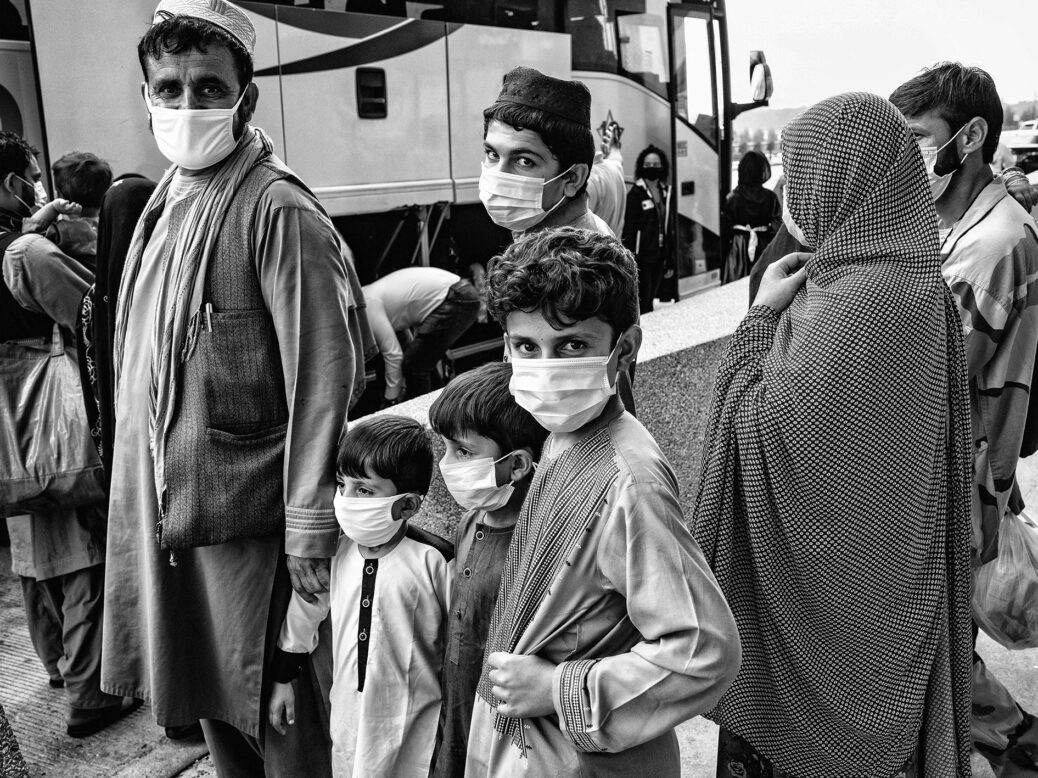
In late August, a young refugee woman, whom I’ll call B, was evacuated by the United States from Kabul – one of thousands of Afghans who departed after the Taliban took over. B was told to come to Kabul airport with nothing more than the clothes she was wearing. On 15 September, a friend of hers in the US told me that B was staying at Fort McCoy – an army base in Wisconsin where roughly 13,000 Afghan refugees are awaiting resettlement – and still wearing those same clothes.
According to B’s friend (who asked that I protect their names for fear of retribution), B and her acquaintances, as of earlier this week, still had not received new clothes from Team Rubicon, a veteran-led disaster relief NGO that is helping to accept and process donations. B’s friend said that the base rules mean that outsiders can’t send packages with clean clothing to individual refugees.
Cheryl Phillips, the director of public affairs for Task Force McCoy, who works in support of Operation Allies Welcome, a Department of Homeland Security-led effort, told the New Statesman that a “robust” donation system is in place for the Afghans at the base. The system is led by Team Rubicon, and that a facility was set up where Afghans could receive mail and packages.
“The Afghan guests are offered three hot meals per day at assigned dining facilities with options including a protein, carbohydrate option, fruits, vegetables and beverages.” Phillips added.
Yet B is not alone in her experience. On 16 September, the Wisconsin State Journal ran a story under the headline, “‘I just want to leave’: Afghan refugees speak out against conditions at Fort McCoy.” That article similarly detailed the long delays surrounding the distribution of both clothes and food.
On 16 September, Gwen Moore and Ilhan Omar, members of Congress from Wisconsin and Minnesota, respectively, wrote a letter to Lloyd Austin, the US defense secretary, to investigate conditions at the base. And one recent report by Minnesota Public Radio suggests that it could take months to resettle the people that are held there.
Complaints have not only come out of Fort McCoy. Earlier this month, a viral tweet from Hamed Ahmadi, who is a refugee awaiting resettlement at Fort Bliss in Texas, drew attention to the fact that refugees were only being given a small amount of food twice a day. “Not complaining but this is what I got last night for dinner and the next meal is 12 hours later. Refugee life might be safe but never easy & favorable. Fort bliss El Paso Texas,” [sic] he tweeted. “I think the problem with the situation here is the government is not prepared,” Ahmadi later told KTSM, an El Paso, Texas-based television channel.
Ahmadi, per his Twitter, has since said that the situation at Fort Bliss improved thanks to better communication. Still, the discussion his tweet sparked is revealing in two broader ways.
The first is that the US, which scrambled to evacuate tens of thousands of people after Kabul fell to the Taliban in late August, does not appear to have been prepared to immediately take care of them. A spokesperson for Fort McCoy acknowledged to the Wisconsin State Journal that there were “supply chain” issues originally, although they said the situation had improved.
And the second issue is that, despite Ahmadi’s insistence on his own gratitude, many replied to his tweets scolding him for being insufficiently appreciative of what the US had managed to provide.
It is true, of course, that the US has provided something. Afghan refugees at Fort McCoy and Fort Bliss are being treated better than many others who seek asylum in the US, such as the Haitians presently being forcibly deported from Texas, some of whom a US border guard was photographed using a whip like cord against. It is true that they are not living in limbo, unsure of whether they will be sent back to Afghanistan, like Afghans who sought asylum in Greece. And it is true that they were evacuated in the first place.
But the notion that the US is doing a favour to refugees from Afghanistan is misguided. The Taliban as it exists today is arguably a direct result of American forces remaining in Afghanistan beyond the early 2000s, creating conditions that allowed the Taliban to resurge. The US killed civilians in drone strikes in the country – including earlier in September. And the manner in which the US departed meant that tens of thousands of vulnerable Afghans were left scrambling to get out, and that tens of thousands more were left behind.
All of which is to say that, at the very least, the US should not pat itself on the back for providing insufficient food and clean clothing.
Earlier this month, B’s friend stressed how grateful they both were that B was out of Afghanistan and in the US.
Still, she said, “As Americans, we have a responsibility to do better.”



